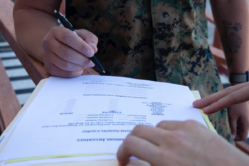The IRS announced in 2018 that over 130,000 disabled veterans are due refunds from the IRS due to a “computer glitch,” which caused the IRS to incorrectly withhold taxes on disability severance payments to combat-injured veterans. These payments should be non-taxable payments, just like disability compensation from the VA.
This error occurred between 1991 and 2016 until the problem was formally identified and addressed. The result was the passing of the Combat-Injured Veterans Tax Fairness Act of 2016. It has taken the DoD close to two years to help identify impacted veterans and coordinate with the IRS to inform affected veterans.
The IRS is sending letters to affected veterans, their family members, and survivors informing them of the error and their eligibility for a tax refund using the Combat-Injured Veterans Tax Fairness Act Claim.
The IRS believes many veterans will be eligible for refunds of $1,750 or more, depending on their specific circumstances. The National Veterans Legal Service Program (NVLSP) estimates that some veterans may be due refunds exceeding $10,000.
This article explains the situation and describes how to submit a Combat-Injured Veterans Tax Fairness Act Claim by filing an amended tax return to claim the amount of money incorrectly withheld from the veteran’s severance payments.
The Problem – Disability Severance Pay Incorrectly Taxed
Thousands of military members are either voluntarily or involuntarily separated from the military each year. Many of these veterans are eligible to receive separation pay, normally taxed at the 20% – 25% range.
However, veterans who are separated due to a combat-related injury or illness should not have to pay taxes on their separation pay. From 1991 to 2016, the IRS computer system failed to classify certain veterans as having tax-exempt separation pay when they were separated from the military.
These veterans had taxes incorrectly withheld from their separation pay and are due refunds from the IRS. Members will need to file an amended tax return.
Note: this does not impact regular VA disability compensation or withholding from disability compensation – this only applies to incorrectly taxed separation pay due to a combat-related disability rating.
How to Determine if You Are Eligible for a Tax Refund
Affected veterans include those who received a disability discharge between January 1991 and December 31, 2016, and also received disability separation pay. This would also apply to surviving family members of these veterans, if the vetean has since passed away.
The IRS is sending out notification letters to veterans informing them of their eligibility to file a Combat-Injured Veterans Tax Fairness Act Claim. However, the letters do not state the amount of money that was erroneously withheld. The IRS began sending these letters on July 9, 2018, and will continue sending them through July 20, 2018.
Members can still file a claim if they believe they were impacted, but did not receive a letter. However, the veteran will be required to submit proof they were impacted. This would include submitting a copy of your DD Form 214, a copy of your severance pay (if you have it) or a letter from DFAS stating you received disability separation pay. You may also have to send in a copy of your VA disability award letter stating you have a combat-related injury.
- Related: learn more about filing a VA Disability claim.
What if the veteran has passed away?
Surviving family members or a court-appointed trustee can file a claim. Surviving spouses can file the claim using the amended tax return, Form 1040X. A court-appointed trustee must use IRS Form 1310 (Statement of Person Claiming a Refund Due to a Deceased Taxpayer).
How to File an Amended Tax Return
You must file an amended tax return to receive a tax refund. You generally only have three years to file an amended tax return. However, the IRS is waiving the statute of limitations for this instance due to the government error.
The IRS press release states that affected veterans “should file Form 1040X, Amended U.S. Individual Income Tax Return, to claim a credit or refund of the overpayment attributable to the disability severance payment.”
There are two ways to file a claim:
The default method, or by calculating the amount that was incorrectly withheld.
The Default Method:
This is the easiest way to file the claim, as the IRS has prequalified you as eligible. All you need to do is fill out the form and submit your claim.
The default refund amount is based on when you were separated:
- $1,750 for tax years 1991 through 2005
- $2,400 for tax years 2006 through 2010
- $3,200 for tax years 2011 through 2016
Calculating the incorrect amount withheld:
This takes more work and requires you to dig through your financial records and past tax returns (if you still have them).
However, it could result in a larger refund, particularly if you had a long military career or were higher ranking prior to your separation (separation pay is generally based on your years of service and base pay, so the more years in service and a higher rank result in a larger separation payment).
- Related: Learn more about military separation pay, and disability severance pay.
How do I obtain copies of past tax returns?
Most people don’t keep copies of their tax returns for more than a few years (the IRS recommends keeping copies for seven years). You can request copies from the IRS. However, they generally only keep copies of tax returns for a certain time.
You may be better off requesting the default refund if neither you or the IRS have copies of your tax returns.
You can learn more about how to file an amended tax return in this article.
Where to Send Your Disability Separation Claim:
Internal Revenue Service
333 W. Pershing Street, Stop 6503, P5
Kansas City, MO 64108
Where to Get Help
You can contact your local IRS Taxpayer Advocate’s office, a tax professional, or a Veterans Service Organization.
Sources: IRS Press Release, IRS, and CBS News.




Comments:
About the comments on this site:
These responses are not provided or commissioned by the bank advertiser. Responses have not been reviewed, approved or otherwise endorsed by the bank advertiser. It is not the bank advertiser’s responsibility to ensure all posts and/or questions are answered.
Megan Cain says
We sent in an amended tax return May 15. Have not heard anything back and it’s been a little over 3 months. The main frustration is that there is no way to check in any of it. I have delivery confirmation from the post office that the irs received it on May 15th but because ours were from 2007 the online tool doesn’t work. Just in limbo wondering if it’s getting worked on or lost in the shuffle.
james flynn says
hi I am 100% and was wondering if I get a tax return
Carrie says
Any ideas on where to find records of the disability severance pay and w-2’s? I can’t find mine I order to file the amended tax form. I’ve called several different agencies listed in the letter only to be told they don’t have the records.
Ryan Guina says
Hello Carrie, I would contact your branch of service’s primary personnel center (HRC, AFPC, BUPERS, etc.). They may have the records or may be able to point you in the right direction. You may also try contacting DFAS or the VA. I’m not sure who to contact beyond that. I wish you the best, and thank you for your service!